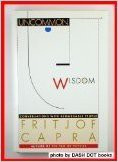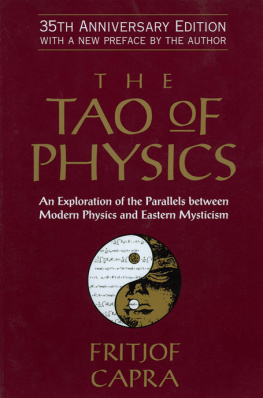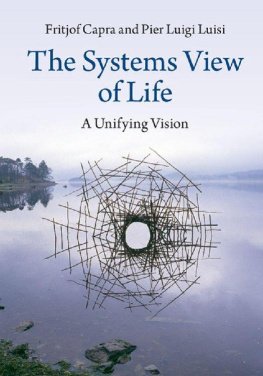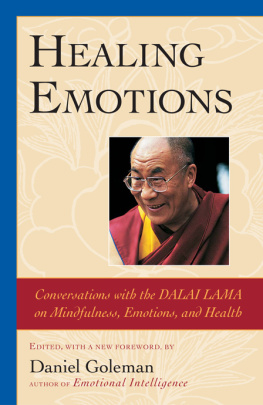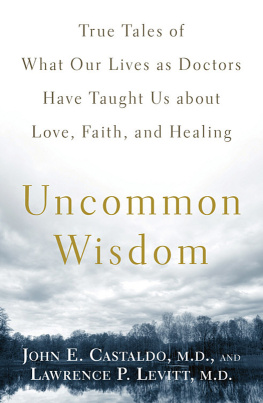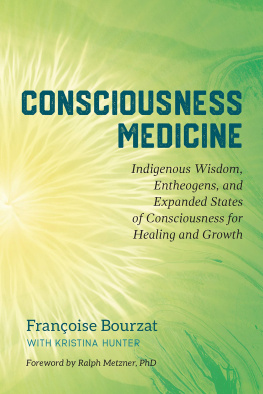Fritjof Capra - Uncommon Wisdom: Conversations with Remarkable People
Here you can read online Fritjof Capra - Uncommon Wisdom: Conversations with Remarkable People full text of the book (entire story) in english for free. Download pdf and epub, get meaning, cover and reviews about this ebook. year: Jan 1988, publisher: Simon & Schuster, genre: Religion. Description of the work, (preface) as well as reviews are available. Best literature library LitArk.com created for fans of good reading and offers a wide selection of genres:
Romance novel
Science fiction
Adventure
Detective
Science
History
Home and family
Prose
Art
Politics
Computer
Non-fiction
Religion
Business
Children
Humor
Choose a favorite category and find really read worthwhile books. Enjoy immersion in the world of imagination, feel the emotions of the characters or learn something new for yourself, make an fascinating discovery.
- Book:Uncommon Wisdom: Conversations with Remarkable People
- Author:
- Publisher:Simon & Schuster
- Genre:
- Year:Jan 1988
- Rating:5 / 5
- Favourites:Add to favourites
- Your mark:
- 100
- 1
- 2
- 3
- 4
- 5
Uncommon Wisdom: Conversations with Remarkable People: summary, description and annotation
We offer to read an annotation, description, summary or preface (depends on what the author of the book "Uncommon Wisdom: Conversations with Remarkable People" wrote himself). If you haven't found the necessary information about the book — write in the comments, we will try to find it.
Uncommon Wisdom: Conversations with Remarkable People — read online for free the complete book (whole text) full work
Below is the text of the book, divided by pages. System saving the place of the last page read, allows you to conveniently read the book "Uncommon Wisdom: Conversations with Remarkable People" online for free, without having to search again every time where you left off. Put a bookmark, and you can go to the page where you finished reading at any time.
Font size:
Interval:
Bookmark:
u c SDOM CONVERSATIONS WITH REMARKABLE PEOPLE F R I T J O F C A P R ,A H % AUTHOR OF THE TAO OF PHYSICS
Also by Fritjof Capra The Tao of Physics The Turning Point Green Politics (with Charlene Spretnak)
Tritjof Capra Uncommon Conversations with NEW YORK LONDON TORONTO SYDNEY TOKYO
Wisdom Remarkable People SIMON AND SCHUSTER
Copyright 1988 by Fritjof Capra All rights reserved including the right of reproduction in whole or in part in any form. Published by Simon and Schuster A Division of Simon & Schuster, Inc. Simon & Schuster Building Rockefeller Center 1230 Avenue of the Americas New York, NY 10020 SIMON AND SCHUSTER and colophon are registered trademarks of Simon & Schuster Inc. Designed by Edith Fowler Manufactured in the United States of America 10 987 654321 Library of Congress Cataloging in Publication Data Capra, Fritjof. Uncommon wisdom. Bibliography: p. Includes index. 1. New Age movement. 2. Capra, Fritjof. I. Title. BP605.N48C37 1988 191 87-20665 ISBN 0-671-47322-0
Acknowledgments More than with any other book it is obvious that this one could not have been written without the inspiration and support of the many remarkable men and women mentioned in its pages, and of the many more not mentioned. To all of them I would like to express my deep gratitude. I am also grateful to my family and friends for their critical reading of various portions of the manuscript; especially to my mother, Ingeborg Teuffenbach, for valuable editorial suggestions, and to my wife, Elizabeth Hawk, for helping me to refine my text throughout the entire writing. Finally, I would like to thank my editors at Simon and Schuster, Alice Mayhew, John Cox, and Debra Makay, for their superb and sensitive editing of the text.
Contents Preface 11 Howling with the Wolves 17 Werner Heisenberg7- Krishnamurti No Foundation 50 Geoffrey Chew The Pattern Which Connects 71 Gregory Bateson Swimming in the Same Ocean 90 Stanislav Grof and R. D. Laing The Search for Balance 149 Carl SimontonMargaret Lock
CONTENTS 6 Alternative Futures 206 E. F. SchumacherHazel Henderson 7 The Big Sur Dialogues 262 Gregory Bateson, Antonio Dimalanta, Stanislav Grof, Hazel Henderson, Margaret Lock, Leonard Shlain, Carl Simonton 8 A Special Quality of Wisdom 299 Indira Gandhi Bibliography 319 Index 323
Preface In April 1970 I received my last paycheck for research in theoretical particle physics. Since then I have continued this research at various American and European universities, but none of them could be persuaded to give me financial support. The reason for this lack of support is that since 1970 my research in physics, even though it has been an essential part of my work, has taken only a relatively small portion of my working time. The far larger part is spent doing research of a much broader scope, research that transcends the narrow confines of current academic disciplines, research in which I often explore uncharted territory, sometimes going beyond the limits of science as they are currently understood or, rather, trying to push those limits outward into new areas. Although I have pursued this research as tenaciously, systematically, and carefully as my colleagues in the physics community are pursuing theirs, 11
12 PREFACE and although I have published my results in a series of papers and two books, it was and still is far too novel and controversial to be supported by any academic institution. It is characteristic of any research at the frontiers of knowledge that one never quite knows where it will lead, but, in the end, if everything goes well, one can often discern a consistent pattern of evolution in one's ideas and understanding. This has certainly been the case with my work. Over the past fifteen years I spent many hours in intense discussions with some of the leading scientists of our time; I explored various altered states of consciousness, with and without teachers and guides; I spent time with philosophers and artists; I discussed and experienced a whole range of therapies, physical as well as psychological; and I participated in many meetings of social activists in which the theory and practice of social change were debated from different perspectives against a variety of cultural backgrounds. It often seemed that each new understanding opened up more new avenues to be pursued, more questions to be asked. However, looking back on this time from the vantage point of the mid-eighties, I can see that throughout the past fifteen years I have consistently pursued a single themethe fundamental change of world view that is occurring in science and in society, the unfolding of a new vision of reality, and the social implications of this cultural transformation. I have published the results of my research in two books, The Tao of Physics and The Turning Point, and have discussed the concrete political implications of the cultural transformation in a third book, Green Politics, which I co-authored with Charlene Spretnak. The purpose of the book you are reading is not to present any new ideas, or to elaborate or modify the ideas presented in my previous books, but rather to tell the personal story behind the evolution of these ideas. It is the story of my encounters with many remarkable men and women who inspired me, helped me, and supported my searchWerner Heisenberg, who described to me most vividly his personal experience of the change of concepts and ideas in physics; Geoffrey Chew, who taught me not to accept anything as fundamental; J. Krish- namurti and Alan Watts, who helped me to transcend thinking without losing my commitment to science; Gregory Bateson, who broadened my world view by placing life in its center;
PREFACE 13 Stanislav Grof and R. D. Laing, who challenged me to explore the full range of human consciousness; Margaret Lock and Carl Simonton, who showed me new avenues to health and healing; E. F. Schumacher and Hazel Henderson, who shared with me their ecological visions of the future; and Indira Gandhi, who enriched my awareness of global interdependence. From these women and men, and from the many more I met and interacted with over the past decade and a half, I learned the main elements of what I have come to call the new vision of reality. My own contribution has been to establish the links between their ideas and between the scientific and philosophical traditions they represent. The conversations recorded here took place between 1969, the year I first experienced the dance of subatomic particles as the Dance of Shiva, and 1982, the year The Turning Point was published. I have reconstructed these conversations partly from tapes, partly from my extensive notes, and partly from memory. They culminated in the "Big Sur Dialogues," three days of exciting and enlightening discussions among an extraordinary group of people, which will remain among the high moments in my life. My search was accompanied by a deep personal transformation, which began under the impact of a magical era, the 1960s. The decades of the forties, fifties, and sixties correspond roughly to the first three decades of my life. The forties were my childhood, the fifties my adolescence, the sixties my youth and young adulthood. Looking back on my experience of these decades, I can best characterize the fifties by the title of the famous James Dean movie Rebel Without a Cause. There was friction between generations, but the James Dean generation and the older generation really shared the same world view: the same belief in technology, in progress, in the educational system. None of that was questioned in the fifties. It was only in the sixties that the rebels began to see a cause, which resulted in a fundamental challenge to the existing social order. In the sixties we questioned society. We lived according to different values, we had different rituals and different lifestyles. But we could not really formulate our critique in a succinct way. Of course, we did have concrete criticism on single issues, such as the Vietnam War, but we did not develop any comprehensive alternative system of values and ideas. Our
Next pageFont size:
Interval:
Bookmark:
Similar books «Uncommon Wisdom: Conversations with Remarkable People»
Look at similar books to Uncommon Wisdom: Conversations with Remarkable People. We have selected literature similar in name and meaning in the hope of providing readers with more options to find new, interesting, not yet read works.
Discussion, reviews of the book Uncommon Wisdom: Conversations with Remarkable People and just readers' own opinions. Leave your comments, write what you think about the work, its meaning or the main characters. Specify what exactly you liked and what you didn't like, and why you think so.

